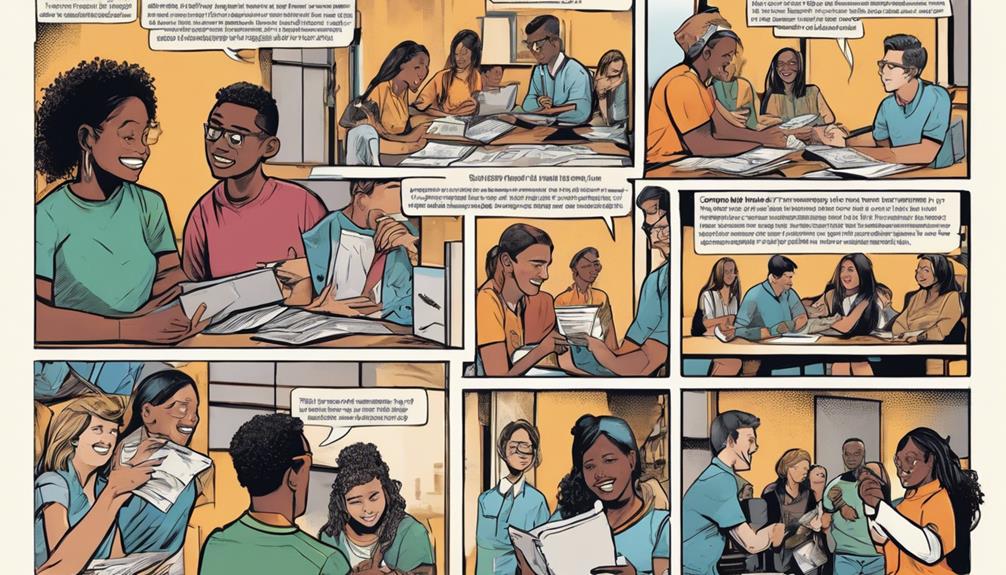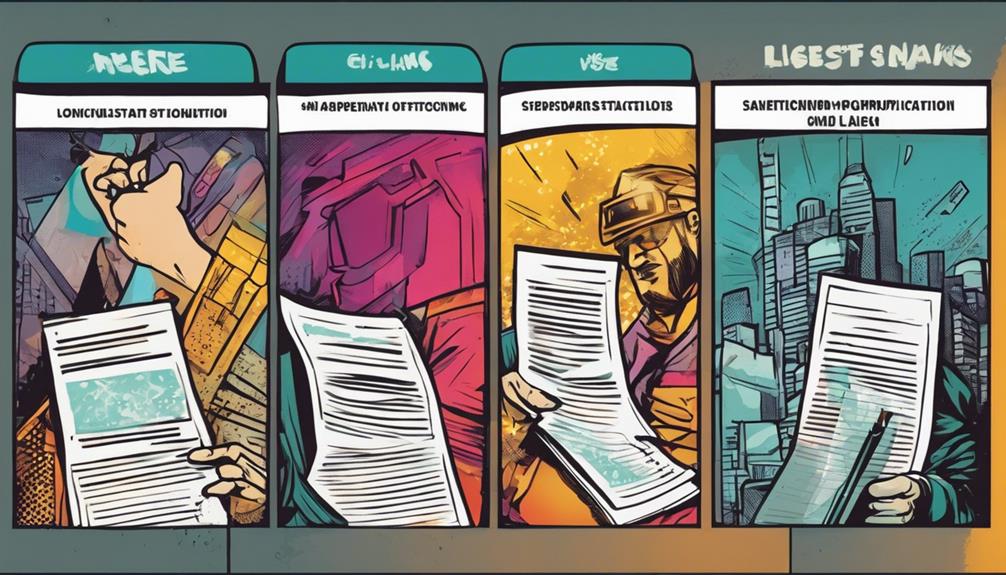Co-signing for student loans is essential for boosting access to education funds. Co-signers must meet age, relationship, citizenship, and credit score requirements, playing an important role in loan approval. Student loan applicants need specific information like NC Assist ID, personal details, and financial data for the application. Co-signers are responsible for ensuring repayment, helping students with limited credit or income access loans. Understanding the benefits and responsibilities involved is necessary. By co-signing, individuals can support students in obtaining necessary funding for their education.
Key Takeaways
- Co-signing for student loans enables access to funds for borrowers with limited credit history.
- Co-signers must meet specific requirements and play a crucial role in facilitating loan approval.
- Co-signers provide assurance to lenders, increasing the likelihood of loan approval.
- Understanding co-signing responsibilities is essential, as co-signers are accountable if the borrower defaults.
- Co-signing benefits borrowers by expanding their access to loans they may not qualify for independently.
Co-Signer Requirements
The Co-Signer Requirements for student loans necessitate individuals to meet specific criteria to qualify for assuming equal responsibility for the debt. Co-signers must be at least 21 years old and have a familial relationship with the student loan applicant, such as a parent, stepparent, grandparent, sibling, spouse, son, or daughter.
Additionally, co-signers must be current citizens of the United States and demonstrate creditworthiness by meeting the required credit score. By fulfilling these requirements, co-signers play an essential role in facilitating access to student loans for applicants who may not qualify on their own.
Understanding and meeting these criteria are vital steps for individuals considering co-signing a student loan to support a student's educational pursuits.
Info Needed to Apply

To initiate the application process as a co-signer for a student loan, what essential information must be provided? As a co-signer, you will need to gather vital details to support the student loan application. This includes the Borrower's NC Assist application ID, the Borrower's last name, and the requested loan amount.
Additionally, you must provide your date of birth, full name, address, phone number, email address, Social Security Number, and Driver's License Number. Ensuring all this information is accurate and readily available will streamline the application process and increase the chances of approval.
Responsibilities and Benefits

What are the key obligations and advantages associated with co-signing for student loans?
When you co-sign a student loan, you are taking on the responsibility of ensuring that the debt is repaid. This means that if the primary borrower fails to make payments, you will be held accountable, potentially impacting your credit score.
However, by co-signing, you are also providing the borrower with access to loans they might not have been able to secure on their own. This can be particularly beneficial for students with limited credit history or income.
Understanding the responsibilities and benefits of co-signing is essential before committing to support a student's pursuit of higher education.
Frequently Asked Questions
Can a Co-Signer Be Removed From the Loan Agreement?
A co-signer can typically be removed from a loan agreement through a process known as co-signer release. This is usually contingent on the primary borrower meeting specific criteria, such as demonstrating a history of on-time payments and financial stability.
How Does Co-Signing Affect the Co-Signer's Credit Score?
Co-signing entwines a financial ballet; a graceful partnership where missteps can mar both credit scores. An elegant waltz where harmony pays debts, but discord may lead to a credit cacophony for the co-signer.
What Happens if the Borrower Defaults on the Loan?
If the borrower defaults on the loan, the co-signer becomes responsible for repayment, including fees and collection costs. This can negatively impact the co-signer's credit score and financial well-being, making it essential to assess the borrower's financial responsibility beforehand.
Can a Co-Signer Apply for a Loan Modification?
When considering a loan modification, it's crucial for a co-signer to understand their role. While co-signers can't directly apply for loan modifications, they can assist the primary borrower in exploring options for repayment adjustments.
Are There Any Tax Implications for the Co-Signer?
When considering tax implications for co-signers, it is worth mentioning that co-signing a loan usually does not have direct tax consequences. The main borrower is accountable for any relevant tax deductions or implications associated with the loan.
Conclusion
To sum up, co-signing for student loans can be a valuable tool in enhancing access to financial assistance for education. By meeting specific criteria and assuming responsibility for the debt, co-signers play an essential role in securing loan approval and supporting students' academic pursuits. Co-signers can also help students secure student loans with more favorable terms and interest rates, especially if the student has limited credit history. However, co-signing is not without risk, as it can impact the co-signer’s credit score and financial standing. It is important for both the student borrower and the co-signer to carefully consider the implications before entering into a co-signing agreement.
Understanding the requirements, responsibilities, and benefits of co-signing is key for those looking to expand educational opportunities. So, seize the opportunity to co-sign and pave the way for a brighter future.









